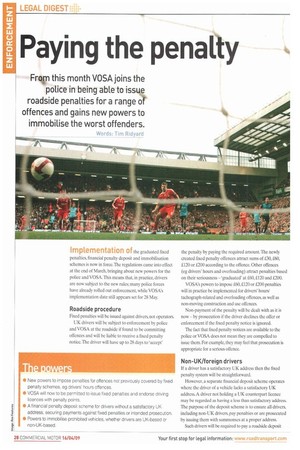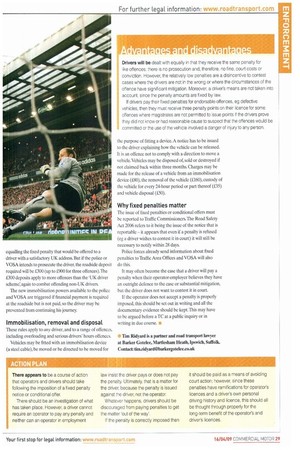Paying the penalty
Page 28

Page 29

If you've noticed an error in this article please click here to report it so we can fix it.
From this month VOSA joins the police in being able to issue roadside penalties for a range of offences and gains new powers to immobilise the worst offenders.
Words: Tim Ridyard Implementation of the graduated fixed penalties, financial penalty deposit and immobilisation schemes is now in force. The regulations came into effect at the end of March, bringing about new powers for the police and VOSA.This means that, in practice, drivers are now subject to the new rules: many police forces have already rolled out enforcement, while VOSA's implementation date still appears set for 28 May.
Roadside procedure
Fixed penalties will be issued against drivers, not operators.
UK drivers will be subject to enforcement by police and VOSA at the roadside if found to be committing offences and will be liable to receive a fixed penalty notice. The driver will have up to 28 days to 'accept' the penalty by paying the required amount. The newly created fixed penalty offences attract sums of £30, £60, £120 or £200 according to the offence. Other offences (eg drivers' hours and overloading) attract penalties based on their seriousness — 'graduated' at £60, £120 and £200.
VOSA's powers to impose £60,12O or £200 penalties will in practice be implemented for drivers' hours/ tachograph-related and overloading offences, as well as non-moving construction and use offences.
Non-payment of the penalty will be dealt with as it is now—by prosecution if the driver declines the offer or enforcement if the fixed penalty notice is ignored.
The fact that fixed penalty notices are available to the police or VOSA does not mean they are compelled to issue them. For example, they may feel that prosecution is appropriate for a serious offence.
Non-UK/foreign drivers
If a driver has a satisfactory UK address then the fixed penalty system will be straightforward.
However, a separate financial deposit scheme operates where the driver of a vehicle lacks a satisfactory UK address. A driver not holding a UK counterpart licence may be regarded as having a less than satisfactory address The purpose of the deposit scheme is to ensure all drivers, including non-UK drivers, pay penalties or are prosecuted by issuing them with summonses at a proper address.
Such drivers will be required to pay a roadside deposit equalling the fixed penalty that would be offered to a driver with a satisfactory UK address. But if the police or VOSA intends to prosecute the driver, the roadside deposit required will be £300 (up to £900 for three offences). The £300 deposits apply to more offences than the 'UK driver scheme', again to combat offending non-UK drivers.
The new immobilisation powers available to the police and VOSA are triggered if financial payment is required at the roadside but is not paid, so the driver may be prevented from continuing his journey.
Immobilisation, removal and disposal
These rules apply to any driver, and to a range of offences, including overloading and serious drivers' hours offences. Vehicles may be fitted with an immobilisation device (a steel cable), be moved or be directed to be moved for the purpose of fitting a device. A notice has to be issued to the driver explaining how the vehicle can be released. It is an offence not to comply with a direction to move a vehicle. Vehicles may be disposed of, sold or destroyed if not claimed back within three months. Charges may be made for the release of a vehicle from an immobilisation device (L80), the removal of the vehicle (£160), custody of the vehicle for every 24-hour period or part thereof (£35) and vehicle disposal (£50).
Why fixed penalties matter
The issue of fixed penalties or conditional offers must be reported to Traffic Commissioners. The Road Safety Act 2006 refers to it being the issue of the notice that is reportable it appears that even if a penalty is refused (eg a driver wishes to contest it in court) it will still be necessary to notify within 28 days.
Police forces already send information about fixed penalties to Traffic Area Offices and VOSA will also do this.
It may often become the case that a driver will pay a penalty when their operator-employer believes they have an outright defence to the case or substantial mitigation, but the driver does not want to contest it in court.
If the operator does not accept a penalty is properly imposed, this should be set out in writing and all the documentary evidence should be kept. This may have to be argued before a TC at a public inquiry or in writing in due course. Ai 0 Tim Ridyard is a partner and road transport lawyer at Barker Gotelee, Martlesham Heath, Ipswich, Suffolk. Contact tim.ridyard@barkergotelee.co.uk








































































































































